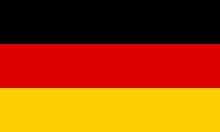Germany at the Winter Olympics
| Germany at the Olympics |
|||||||||
|---|---|---|---|---|---|---|---|---|---|
 |
|||||||||
| IOC code | GER | ||||||||
| NOC | German Olympic Sports Confederation | ||||||||
| Website |
www |
||||||||
| Medals |
|
||||||||
| Summer appearances | |||||||||
| Winter appearances | |||||||||
| Other related appearances | |||||||||
|
1906 Intercalated Games |
|||||||||
Athletes from Germany (GER) have appeared in only 20 of the 22 editions of the Winter Olympic Games as they were not invited to two events after the World Wars, in 1924 and 1948. Germany hosted the 1936 Winter Olympics in Garmisch-Partenkirchen and had been selected to host in 1940 again.
The nation appeared 11 times as a single country (IOC code GER), before World War II and again after German reunification in 1990. Three times, from 1956 to 1964, German athletes from the separate states in West and East competed as a United Team of Germany, which is currently listed by the IOC as EUA, not GER.
Due to partition under occupation that resulted in three post-war German states, German athletes took part seven times for the contemporary states they lived in, in 1952, and from 1968 to 1988. The all-time results of German athletes are thus divided among the designations GER, EUA, FRG, GDR and also SAA (the Saarland only took part in the 1952 Summer games and won no medal).
Including the Winter Games of 2014, German athletes have won 377 medals : 136 gold, 135 silver and 106 bronze. The IOC currently splits these results among four codes, even though only the East German Democratic Republic (GDR) from 1968 to 1988 had sent a separate team to compete against the team of the German NOC that represented Germany (GER) since 1896.
In the Paris Peace Conference, the outbreak of World War I was blamed on Germany and other Central Powers allies. These nations, even though having new republican governments by now, were not invited to the 1920 Summer Olympics. While all other banned nations except Germany were invited again for the 1924 Summer Olympics, held for the second time in Pierre de Coubertin's home town of Paris, and for the 1924 Winter Olympics, also held in France, the ban on Germany was not lifted until 1925. This was likely related to the ongoing French Occupation of the Ruhr and the Rheinland between 1923 and 1925. Thus Germany was not present in Chamonix for the first Winter Olympics.
...
Wikipedia
